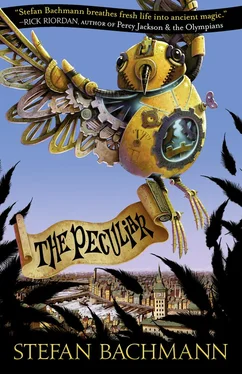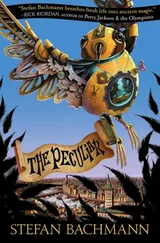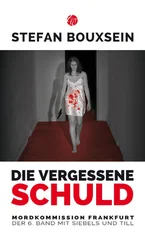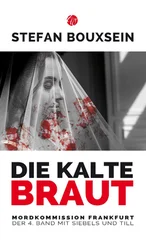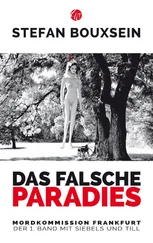A mangy black dog was wandering along the gutter, searching for a cabbage leaf or a bone. At the far end of the alley, two men were conversing quietly in the blue-gray shadows of some eaves. Light the color of lamp oil drifted down from the slit of sky. Across the way, the Buddelbinsters’ house stood hunched around itself. The sour-looking woman was in the yard, a basket of washing against her hip. She was laying sheets out on the grass to dry. She shuffled across the place where the circle of mushrooms had been, once, twice, a dozen times, but nothing happened. No wings, or wind. It didn’t work anymore. The magic was gone.
Bartholomew’s gaze traveled on to the house. Something stirred in an upper window. He tensed, half expecting to see the figure again, the dark one that had stood there the day his friend had been taken. The window swung open. Some flimsy curtains were brushed aside. It was the faery mother, seated on a straight-backed wooden chair, head up, hands in her lap, looking out.
Bartholomew pulled back from the glass. He had hardly ever seen her before. But then he hardly ever saw anyone. She was a wood spryte, small and delicate, with a crown of antlers growing out of her head. She was almost pretty. All but her eyes. They were flat, empty, staring out onto the yard as sightless as marbles. She had been weeping.
Bartholomew squinted at her, puzzled. Does she miss her son? Was he kidnapped, after all? He had almost managed to persuade himself that the lady in plum was a magician of some sort, and a relative, and had taken his friend away with her to give him a better life. But all in an instant he wasn’t so sure. That was not the face of a lonely mother. That was the blank, disbelieving face of someone with so much grief locked up inside her that she didn’t know what to do with it, someone with a barb in her heart that no amount of crying or screaming could ever dull.
In the yard, the sour-looking woman continued to lay out the washing. She faced the house, even walked under the window several times, but she never even glanced at the faery in it. What a rude, mean person, Bartholomew thought. He looked back at the faery mother.
Her mouth had begun to move. Her lips were forming words, but he was too far away to make sense of them. In her lap, her hands folded, unfolded. Slowly she began to rock back and forth in the chair. The sour-looking woman was laying out bedding now, turning the yard into a checkerboard of pillowcases and withered grass.
Bartholomew inched closer to the windowpane. A breeze was picking up. Wisps of the white curtain were blowing across the faery mother’s face, into her antlers and eyes. She didn’t move from her chair.
The breeze gathered in strength. Sheets and bedclothes began to shift, skittering gently across the weeds in the yard. A shadow passed overhead. Bartholomew glanced up and saw that the summer sky had become low and angry, darkening with sudden weather. The sheets began to curl over themselves, piling up into heaps.
The sour-looking woman worked on, flicking out more sheets, even as the other ones twisted across the yard. At the end of Old Crow Alley, the two men were still deep in conversation. The dog had found a scattering of slop and was scratching through it lazily. All seemed oblivious to the flooding darkness.
The breeze was a wind now, churning the bedclothes, picking them up and hurling them into the air. Curtains slashed and flew across the window where the faery mother sat, now obscuring her, now revealing her stark against their whiteness.
Конец ознакомительного фрагмента.
Текст предоставлен ООО «ЛитРес».
Прочитайте эту книгу целиком, купив полную легальную версию на ЛитРес.
Безопасно оплатить книгу можно банковской картой Visa, MasterCard, Maestro, со счета мобильного телефона, с платежного терминала, в салоне МТС или Связной, через PayPal, WebMoney, Яндекс.Деньги, QIWI Кошелек, бонусными картами или другим удобным Вам способом.
